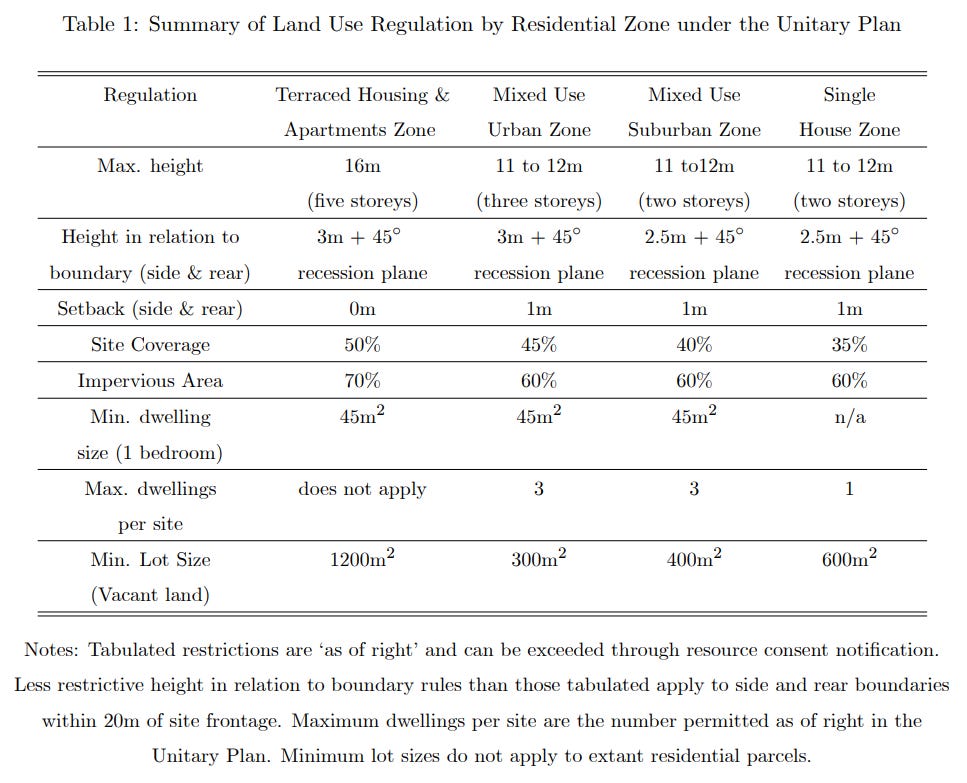What BC is planning to do on a province-wide basis (backgrounder):
Make it legal by right to build three homes on any residential lot, but within existing municipal setback and height limits.
Make secondary suites legal.
Reform approval processes and development charges, as described in the 2019 Development Approvals Process Review report.
In addition, the province can intervene if a municipality is failing to meet its housing targets.
If the province decides to intervene, what could it do?
New Zealand
One approach would be for the province to look at New Zealand’s major reforms, and to apply similar reforms to municipalities where housing is particularly scarce and expensive.
The Auckland Unitary Plan (2016), which upzoned 75% of Auckland’s residential land. See in particular the Mixed Use Urban Zone.
The National Policy Statement on Urban Development (NPS-UD 2020), which requires cities to allow six-storey buildings within walking distance of city centres and rapid transit stops. Approval is still discretionary - a resource consent (roughly equivalent to a development permit, with public consultation) is required.
Medium-Density Residential Standards (2021) which apply to New Zealand’s five largest cities. These allow by-right development, without discretionary approval.
Ontario
Another approach would be for BC to apply the recommendations of the Ontario housing task force to municipalities where housing is scarce.
Override the municipality’s restrictions on height and total floor space (FSR), everywhere. Make it legal by right to build up to four homes and four storeys on any residential lot in the municipality.
Override the municipality’s minimum lot size, setbacks, and parking requirements.
Make it legal by right to build up to six storeys on transit routes (including bus routes), with no parking requirement.
Make it legal by right to build unlimited height and density near major transit stations.
Impose limits on approval timelines.
Impose limits on development charges.
To explain a bit why minimum lot size, maximum homes per lot, and maximum height and FSR are important:
Without zoning restrictions, what you’d get is much denser housing (more dwellings per acre) in a more central location with easy access to jobs. Land prices would be high, but the amount of land consumed by a home in a central location would be relatively small.
When you have a combination of high land prices and restrictive zoning - minimum lot size, total floor space restrictions, height restrictions - the result is that each home is very expensive, because it’s required to include consumption of a lot of land.
People sometimes talk about how homes are more expensive these days because they’re bigger, but if you just shrink the home and the land remains the same, that’s not going to make much difference. What does help is reducing the minimum amount of land per home - ideally by right, so that you don’t need to go through a time-consuming and expensive rezoning.
If you can split a 50-foot lot into two 25-foot lots, each home only needs half as much land.
If you can put a four-plex on a standard 33-foot lot, each home is only consuming 25% of the land.
If you can put a three-storey, eight-unit apartment building on a 50-foot lot, each home is only consuming 1/8 of the land.
Related:
Cost-Benefit Analysis of New Zealand’s Proposed Medium Density Residential Standards, December 2021. Via the Ministry of Housing and Urban Development.
B.C. takes note as New Zealand moves to ban single-family zoning in cities. Derrick Penner in the Vancouver Sun, October 2021.
New Zealand’s bipartisan housing reforms offer a model to other countries. Ryan Greenaway-McGrevy, January 2022.






Not to be too cheeky.... but I keep idly musing how interesting it would be to completely eliminate zoning (or replace it with a very simple rubric) in some sizeable neighbourhoods, and see what happens. I guess it is politically infeasible - Many people of course don't want their neighbourhoods to change, certainly not drastically - I'm on a residential street and would admittedly be ambivalent about a highrise across the street shading my garden. But honestly, there are big parts of Vancouver & Burnaby that are proximate to great transit & that lack much charm.
I keep imagining a political leader sacrificing the votes in those areas & saying - You can build six storey condos & twelve storey rentals; no onsite parking requirement; it has to be all-electric, passive-house & low embodied carbon. Have at it. Govts could buy up some parcels for parks in advance... it would be kind of an interesting experiment & much more analogous to the more laissez-faire processes that originally resulted in some of North America's best architecture.